Since at least the early 1800s, women have played an integral part in advancing the MedTech industry along. Many groundbreaking technologies such as the radioimmunoassay, the syringe, and stem-cell isolation technique, and many more are the results of hard-working female scientists.
One of the greatest discoveries in the world of modern medicine was the discovery of HIV and the mapping of its genes. This medical marvel was accomplished by Flossie Wong-Staal, a Chinese American virologist and molecular biologist. In 1985, Wong-Staal was the first person to clone HIV, which subsequently led to the development of its genetic map. This accomplishment laid the foundation for the development of HIV detecting blood tests and other related treatments and diagnostic devices.[1]
Up until the 1980s, cataracts were a debilitating condition with therapies that were not highly accurate nor comfortable. In 1986, Dr. Patricia Bath invented the Laserphaco Probe system, a first-of-its-kind cataracts treatment. Using this system, Bath was able to help patients who had been blind for decades recover their sight. In addition to her groundbreaking innovation, Bath was also the first African American female doctor to win a medical patent in 1988.[2]
Despite the incredible accomplishments of women in MedTech, there is still a lack of women representation in the industry. According to an October 2020 study, only 20% of executives at the 100 largest medical device companies in the world are women.[3] Despite this less than perfect statistic, it seems like the industry is actually starting to trend towards more diverse representation. The number of women in executive leadership positions is up 4% from the year prior, with more and more companies committing to diversity and inclusion.
As a women-owned business, EMMA International recognizes the hard work of women in the MedTech industry every day. We work with incredible women pioneers, some running their own start-ups, and some working with industry giants. EMMA International provides full-circle solutions for the MedTech industry; call us at 248-987-4497 or email info@emmainternational.com to learn more today.
[1] NIH Center for Cancer Research (July 2020) In Memoriam: Flossie Wong-Staal, Ph.D. retrieved on 08/08/2021 from: https://ccr.cancer.gov/news/article/in-memoriam-flossie-wong-staal-phd
[2] US National Library of Medicine (n.d.) Dr. Patricia E. Bath Biography retrieved on 08/08/2021 from: https://cfmedicine.nlm.nih.gov/physicians/biography_26.html
[3] Danielle Kirsh (Oct 2020) Diversity in medtech: Just 20% of executives roles held by women retrieved on 08/08/2021 from: https://www.massdevice.com/medtech-diversity-women-executives-2020/






